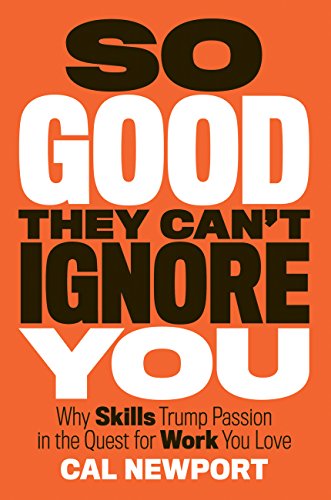What We're Reading Now
Stop Worrying About Your Passion and Just Do the Work
2 October 2018
Barbara read So Good They Can’t Ignore You: Why Skills Trump Passion in the Quest for Work You Love by Cal Newport. It turns out discomfort and hard work may help you realize your dreams faster than the pursuit of passion.
Tags: barbara read, careers, learning
Newport thinks the popular idea of following your passion to find the perfect career is not only bad advice, but dangerous. He said the concept began in 1970 with the first publication of What Color is Your Parachute and has created a group of people, especially the young entering the work force, who are dissatisfied with their work and who think there is a dream job somewhere that will make them happy. They just haven’t found it yet.
He believes you’ll find your passion when you’ve worked hard enough and long enough to get good at a skill. You rarely find it before you invest significant time and rigorous mental energy. You will come to love your work because you get good at it or the expertise you acquire by working hard in a less than ideal job will lead you to the next best thing.
He assigns the term “passion mindset” to describe the behavior when you are focusing “on the value your job is offering you.” He recommends a “craftsman mindset,” which “focuses on what you are offering to the world.”
The craftsman mindset “asks you to leave behind self-centered concerns about whether your job is ‘just right,’ and instead put your head down and plug away at getting really damn good. No one owes you a great career….you need to earn it—and the process won’t be easy.”
Newport used a quote from Steve Martin for the title of his book. When interviewed, Martin said that no one ever wants to hear what he has to say. “What they want to hear is ‘Here’s how you get an agent, here’s how you write a script’…but I always say, ‘Be so good they can’t ignore you.’” Martin took banjo lessons for 40 years saying he might get good. He now tours with a band, an additional career to his comedy work. That was indeed a long-range plan.

To acquire excellence in a skill, you need “deliberate practice, an approach to work where you deliberately stretch your abilities beyond where you’re comfortable and then receive ruthless feedback on your performance. Musicians, athletes, and chess players know all about deliberate practice. Knowledge workers, however, do not. This is great news for knowledge workers: If you can introduce this strategy into your working life you can vault past your peers in your acquisition of career capital—the skills you have that are rare and valuable to the working world.”
Newport gave a personal example of when he wouldn’t do deliberate practice. He and a friend started taking guitar lessons at the same time. By the time they were 18, his friend was much better than he was because his friend always wanted to practice something new that was harder than what he already playing. Newport did not. He wanted the pleasure of playing over and over the songs he had already learned. He wrote, “Even at a young age I realized that my discomfort with mental discomfort was a liability in the performance world.”
He learned valuable insight from that experience and took it into his chosen academic field. “When I’m learning a new mathematical technique—a classic case of deliberate practice—the uncomfortable sensation in my head is best approximated as a physical strain, as if my neurons are physically re-forming into new configurations.” He daily schedules that kind of discomfort for himself.
Besides the mental strain of focusing on what is new and more difficult to develop rare and valuable skills, you need to “embrace honest feedback—even if it destroys what you thought was good.”
In the past, I have gotten feedback in my writing class that I don’t give enough detail. At my last class, I finally gave too much information. My teacher and classmates were not interested in it and told me so. Earlier, that negative feedback would have made me blue for days. Because I had just read this book, I reminded myself that it is important to not only tolerate but also become more comfortable with discomfort in order to improve. When I want the writing to come more easily to me and my readers to celebrate the words, I remind myself I just need to do the work.
What would be deliberate practice that causes discomfort in your work or personal life?







Comments
Our Comment Policy:
Our blog posts are only half of the conversation. What our readers have to say is equally important to us, and we're grateful for all the comments that continue the dialog.
To ensure that the discussion here is as useful as possible to all of our readers, please be respectful of our contributors and refrain from harassing, threatening and/or vulgar language. We reserve the right to screen and remove any comments from the site. If you have a question about a comment or want to discuss our policy, please contact us. We'll talk it over.
There are no comments for this entry yet.